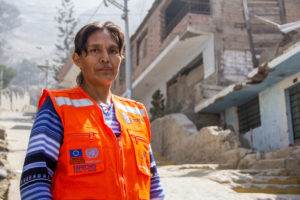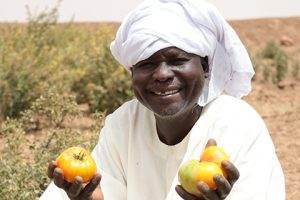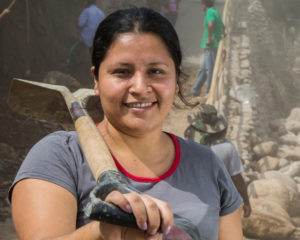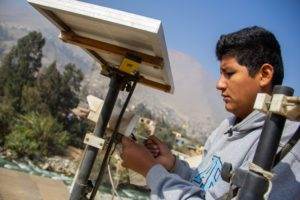What is climate resilience and why is it important? Find out more about how people around the world are adapting to the rapidly changing climate and protecting their lives and livelihoods from future challenges.
What is climate resilience?
Climate change is associated with both rapid-onset events such as floods, hurricanes or wildfires and slow-onset events such as sea level rise or desertification.
Climate resilience is the ability of social, economic and environmental systems to withstand these impacts so that they can thrive in spite of the impact.
As many communities and natural environments around the world already suffer climate change impacts, it has become a major priority to take actions that reduce vulnerability to these impacts, especially by taking actions to increase their capacity to enact climate change adaptation.

In Peru, Deborah has seen her community’s homes and businesses destroyed by floods. We worked with her to create evacuation plans so she can help keep her community safe.
We define resilience as the ability of a system, community, or society to pursue its social, ecological, and economic development and growth objectives, while managing its disaster risk over time in a mutually reinforcing way. This captures the essential forward-looking component of resilience; we do not want people to be resilient while denying their aspirations to improve their wellbeing.
Why is climate resilience important?
Climate change has triggered an increase in extreme weather events such as floods and droughts. It’s also causing long-term changes to weather patterns that are destroying livelihoods.
As the effects of the climate crisis become increasingly tangible, vulnerable and hazard-prone communities face growing, complex, and worsening challenges.

In 2015 in Nepal, an earthquake killed around 9,000 people and damaged or destroyed around 600,000 buildings. We’re working with communities to use earthquake resistant bricks, made from locally-available materials, to make their homes more resilient to future earthquakes.
Who most needs climate resilience?
Climate resilience is especially critical in countries that are most vulnerable to climate change and are already feeling the impacts on a daily basis.
Poorer areas are often hardest hit. Poverty forces people into disaster-prone areas where making a living is almost impossible. And it means they’re ill-equipped to adapt to the changing climate, leaving them even more vulnerable to future disasters.

In Sudan, climate change has turned acres of farmland into desert. We’re working with farmers like Adam to use solar-powered irrigation to turn the desert green again.
What is Practical Action doing?
We’re helping people adapt to existing changes and prepare for future ones. We work closely with communities to develop simple, practical solutions that can help minimise the ways in which floods, droughts and extreme weather affect their lives and opportunities.
Our key areas of focus:
- Advising people on how to adapt their lives to a changing climate
- Working with communities to put systems in place to predict natural hazards and prepare plans to minimise their impact
- Promoting environmentally sound technologies for low carbon and climate resilient development.

Purnima in Bangladesh saw her farmland repeatedly flooded and her livelihood destroyed. With our help, she’s discovered new ways to farm in the wetlands.
Our teams around the world are seeing with their own eyes the impact of climate change on people in poor areas. But we’re also demonstrating that ingenuity can help them adapt and thrive.
More about our climate resilience work
Author

Demet Intepe
Researcher and policy expert in climate justice, climate change adaptation, and sustainability. Currently leading on the mainstreaming of climate change adaptation and mitigation across Practical Action’s programmatic and policy work, as well as Practical Action’s organisational commitment to sustainability.

